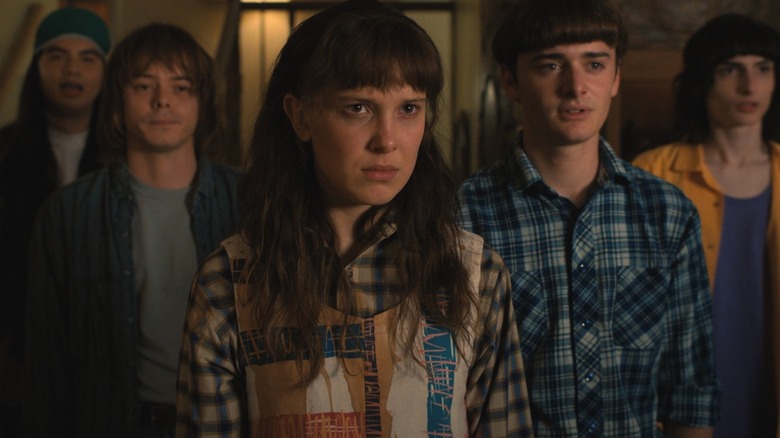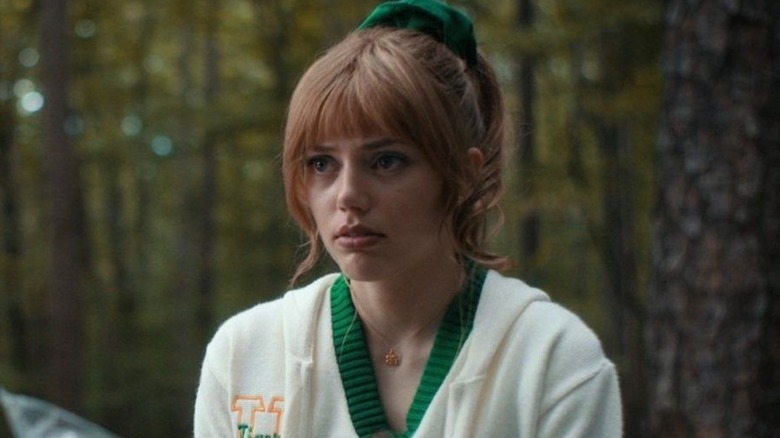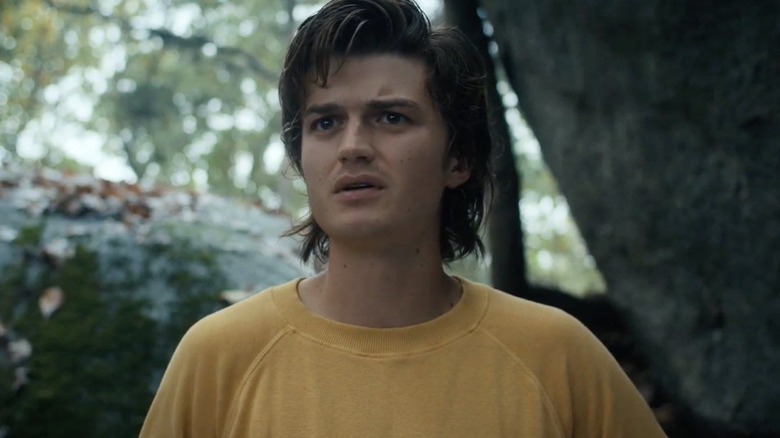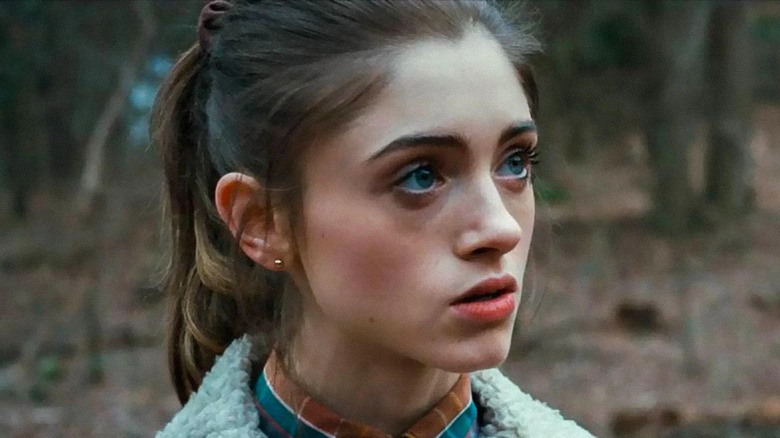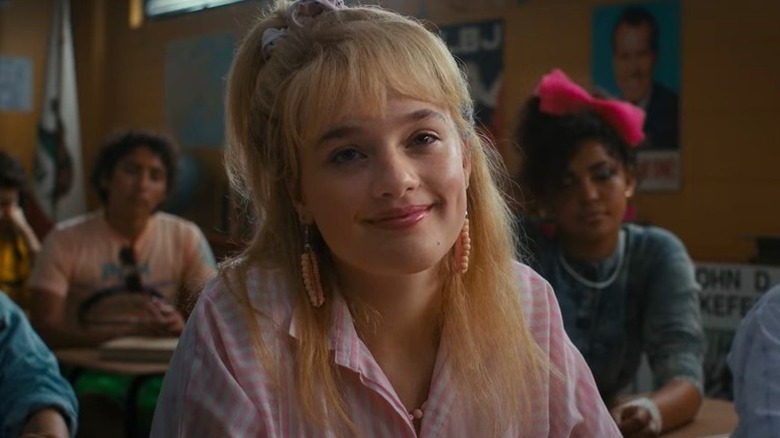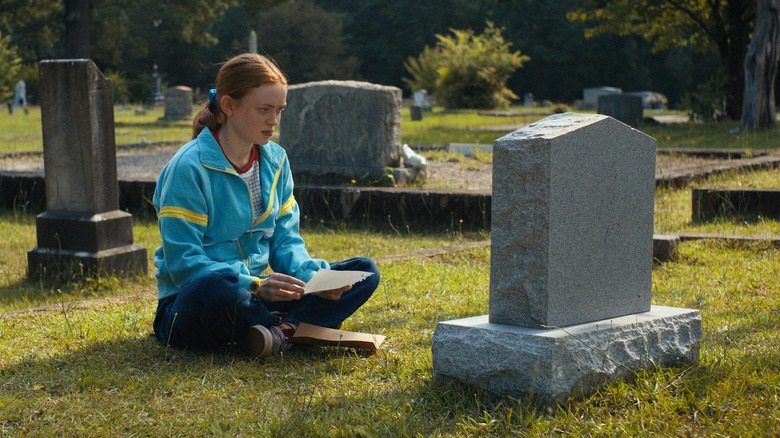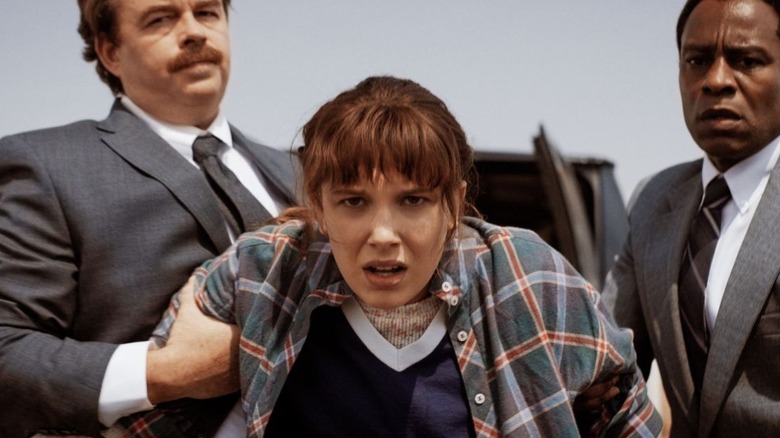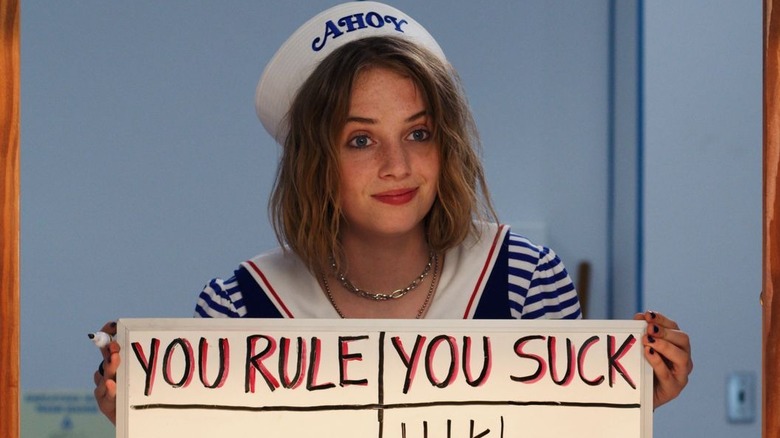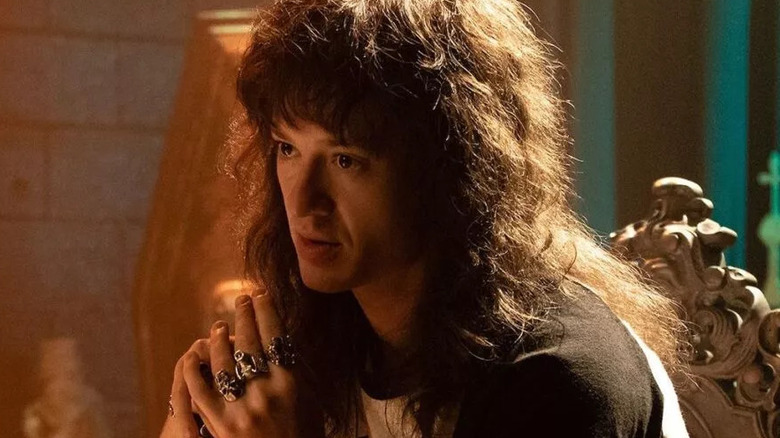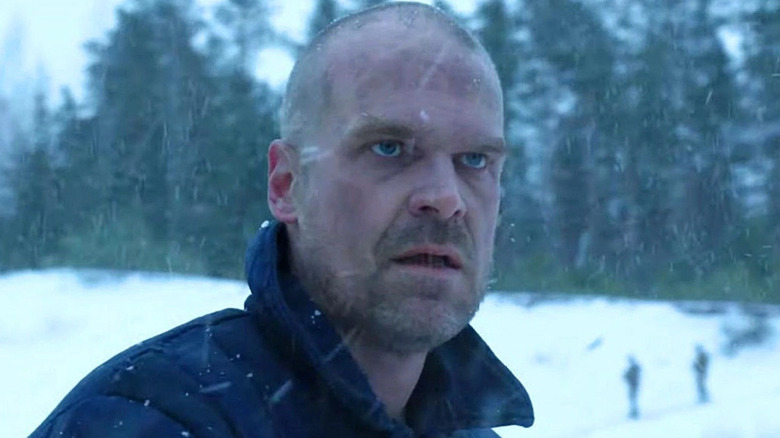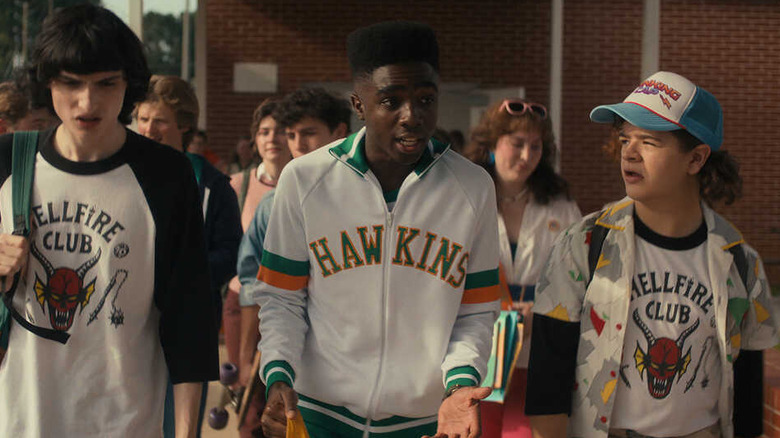The Best And Worst Things About Stranger Things Season 4 Part 1
"Stranger Things" is a 1980s remix. Its breakout season spun gold from a ton of Amblin influences, such as "E.T." and "The Goonies," and its subsequent installments have mashed "The Thing," "Gremlins," and "Ghostbusters" into expansive, small-screen comfort food. "Stranger Things" believes in translating the big-screen blockbuster feel to television. If the Duffer Brothers' show was a breath of fresh air when it attempted that trick six years ago, it's as much an institution now as Marvel, DC, or Pixar.
Most movingly, though, is the degree to which the latest season of "Stranger Things" takes a clear-eyed stare at aging and mortality. The cast of "Stranger Things," as we'll cover, is only getting older. The show as it exists (plucky teens confronting the Upside Down) literally can't continue as is. The story and its characters are riding towards the sunset and giving the fans what they want along the way — a project so big, filling, and digestible, that you can't imagine having anything else, if only for a moment. However, even the record-breaking beloved series has its missteps. Here are the best and worst things about "Stranger Things" Season 4, Part 1.
Best: Meaningful horror
"Stranger Things" doesn't shy away from shocking horror. When Barb was cruelly dispatched in the show's first season, it proved the Duffer Brothers' show meant business. Whether you most remember Bob getting mauled by Demodogs or the many casualties of The Mind Flayer, the losses of life are memorable. More than that, they're often meaningful.
To paraphrase Paul Reiser's Owens, though, each time "Stranger Things" returns it must come back "stronger, smarter, and deadlier." Enter Chrissy (Grace Van Dien) and Vecna (Jamie Campbell Bower). Chrissy is Vecna's first on-screen victim, the it-girl cheerleader of classic high school archetypes. She's dating Jason (Mason Dye) and is unapproachably beautiful. The latter proves false and the former opaque. Chrissy, suffering from terrifying visions, comes to Hellfire Club leader Eddie (Joseph Quinn) for anxiety soothing "herbs." Their connection is sudden but genuine. Chrissy remembers Eddie's band from a talent show; Eddie makes space for Chrissy's fear. All of this endears us to her quickly.
It also makes her loss more devastating and shocking. When Chrissy comes to Eddie's home for stronger medicine, Vecna projects a house of horrors onto it, leaving Chrissy lost and panicked. She finds her abusive mother looking demon-eyed. Her father is downstairs, eyes and mouth sewn shut. The sequence ends with Chrissy floating in front of Eddie, her limbs snapping akimbo, eyes sucking back into her skull. It's a moment of pure nightmare fuel that keeps the stakes of "Stranger Things" high, both viscerally and emotionally.
Worst: The actors' ages
There is a long and rich television tradition of actors that are far too old to be playing high schoolers saddling up and playing high school characters. Fox Network (think "The O.C.") practically made its name on this phenomenon. Ditto The WB and its offshoot The CW. It's a trope that has been worthy of parody and is due for scrutinization in the wake of projects that traffic in powerful, age-appropriate casting. "Stranger Things" was one of those projects, but it no longer is.
Season 4 finds the kids we know and love — El, Mike, Will, Dustin, and Lucas — joining their siblings and older friends in high school. With one or two notable exceptions, every performer has aged out of their roles by a noticeable margin. This particularly applies to Steve (Joe Keery), Nancy (Natalia Dyer), and Jonathan (Charlie Heaton), all of whom are played by actors either approaching or are actually 30. Is this inherently problematic? No, not at all. Does it make the show's "high school is hell" storylines a little harder to swallow? Yes. At best, the ensemble's undeniable talent saves the day. At worst, it makes "Stranger Things" almost feel like a parody of the genre it's trying to sincerely tell stories about.
Best: The actors' ages
That said, let's play devil's advocate to ourselves. "Stranger Things" premiered in the summer of 2016, five months before an election that would turn America (and the world, by extension) upside down. The show has been a pop-culture constant ever since. It has, either by design or accident, reflected the strangeness and horror of the world back to us. (Season 4's opening sequence, which generated a necessary trigger warning in the wake of the Uvalde mass shooting, is grimly illustrative of this fact.)
Given this, the "Stranger Things" actors looking a bit too old for their parts tells a story that runs underneath the show's real story, namely that this cast has grown up in front of its audience's eyes during one of the more turbulent moments in history. Whenever the show flashes back to prior seasons, that becomes clear. Those moments bear the weight of both the show's history and the viewer's history with it. The cast has grown up before our eyes, and we've grown up with them. The show makes zero effort to hide this, and, when it weaponizes that fact in "Dear Billy," it packs a gut-punch wallop of unimaginable proportions. Sometimes realism is overrated.
Worst: The new players
This one's tough to admit. "Stranger Things" has had tremendous success in filling out its world with compelling secondary characters. Max (Sadie Sink) has become as, if not more, essential than the core players from Season 1. And I sincerely doubt that anyone would have had "Murray Bauman and Joyce go on an espionage-rich trek to Russia" on their Season 4 bingo card when Murray first appeared in Season 2. The Duffer Brothers love characters. They are as loathe to kill them off as they are to leave them on the bench. When they add a new character to the "Stranger Things" mythos, that gesture means business.
What's tricky about "Stranger Things" Season 4, then, is how uneven its new additions are. Yes, Eddie (Joseph Quinn) and Argyle (Eduardo Franco) are unfathomably wonderful. So is Chrissy up until the moment she perishes — which, as we've mentioned, occurs early. But a handful of the new faces we encounter in Season 4 amount to lambs culled for Vecna's slaughter. The others are Russian bad guys, violent jocks, or high school bullies built from fairly cliche parts. (Looking at you, Angela.) On the one hand, this is all well and good. "Stranger Things" has announced its 5th season shall be the last, and there's little reason to overcrowd the ensemble now. On the other, it's one of this season's most dissatisfying elements.
Best: Dear Billy
"Stranger Things" has been in our lives for six years. After more than half a decade, the formula for its success is more than clear: transcendent riffs on blockbuster tropes that run into one-of-a-kind character beats. It's fun to see something channel "The Great Escape." It's meaningful because Hopper, mid-escape from a Russian super-prison, finds a carton of JIF peanut butter and cries with joy to discover both food and an echo of home. When "Stranger Things" hits the sweet spot between film aesthetics and TV character development, few shows can match it.
"Dear Billy" is that sweet spot. It includes the previously mentioned prison escape. Midway through the episode, director Shawn Levy flexes a one-take, close-quarters shoot-out that's nerve-racking and ecstatically fun. The story jumps between multiple decades and finds room for a mini haunted house movie to boot. Most importantly, though, "Dear Billy" is a deep dive into Max; how she loves, and if the love in her life is enough to heal a life's worth of pain. This isn't just good television. It's expansive, singular entertainment. "Dear Billy" couldn't exist without the full weight of Netflix behind it, without decades of prestige television and film making its scope and references possible. It takes both and runs with them. By the time it crosses the finish line, "Dear Billy" cements itself as one of the best-ever "Stranger Things" installments, and one of 2022's best TV episodes, period.
Worst: The Monster and the Superhero
The first two episodes of "Stranger Things" Season 4, Part 1 unleash a dizzying amount of new status quos. We get the Byers in California and Eleven without her powers, Jonathan as an incompetent stoner, and the emergence of Will's queer identity and unrequited affection for Mike. None of those stories even touches Vecna's rain of terror or Hopper's imprisonment in a Russian gulag. There's a lot going on. (It's little wonder, in retrospect, that so much of this "Stranger Things" season traffics in feature-length movie running times.)
The show's third episode, "The Monster and the Superhero" attempts to coalesce these disparate threads. It reintroduces Paul Reiser's Sam Owens and sets El on the path back to Hawkins. Joyce and Murray head to Alaska and, hopefully, Hopper. These are understandable, necessary moves for the show to make. "The Monster and the Superhero" makes the fourth season feel whole.
The issue, though, is that the episode's supercharged momentum circumvents many of the plot's relative breathing rooms. El getting bullied by Angela (Elodie Grace Orkin)? A means to an end. Jonathan and Nancy's relationship trepidation? No time for that anymore. "The Monster and the Superhero" makes it possible for the back half of Season 4, Part 1 to soar, but it does so at the expense of the show's many players. That makes it one of the season's weakest installments, if not it's very worst.
Best: The episode length
When "Stranger Things" Season 4's runtimes were revealed, Twitter was predictably incensed. It was also predictably wrong. Yes, the Season 4 episodes are long, often running at feature-film length. This is the natural evolution for a show that's aspired to translate blockbuster cinema to the realm of television. What's more, it makes good on its fusion of aesthetics through that length. "The Hellfire Club" episode spends 70-plus minutes establishing the season's major players before a single set-piece occurs. This gives the impending chaos stakes and emotional heft.
In "Dear Billy," a mid-episode action sequence would be the climax or highlight of any other show. Here, it's one of many afforded by both the episode length and the budget Netflix afforded it. A bloated show is no good; a show being the most effective and excellent version of itself is. By and large, "Stranger Things" falls into the latter this season and we have the season's episode lengths to thank for it.
Worst: The mid-season break
Let's give Netflix and the Duffer Brothers their due: breaking up a set of episodes that are largely feature-length seems wise. Yes, "Stranger Things" by and large earns its gargantuan run times. That doesn't mean, however, that binging an entire season of longer episodes would be palatable for viewers. Dividing this season up is a wise move and for that, all involved should be commended. The issue is where they're divided. Put simply, "Stranger Things" is a show designed to get in then out of the cultural zeitgeist. It is memorable and resonant but not a conversation piece. That's a feature and not a bug of its construction.
Given that, releasing more than three-fourths of the show before its coda six weeks later seems unwise. Why not follow the model of Netflix's own "Fear Street," which owed more than a debt to the Duffer Brothers' work (and shared some "Stranger Things" actors) and dropped across three subsequent weeks? A "Stranger Things" Season 4 that concludes with "Dear Billy" one week, the excellent "The Massacre at Hawkins Lab" the next, and whatever the finale is one week later stands to achieve the kind of cultural dominance now typically reserved for comic book media and "Star Wars." This could work out in the long run but, for now, it's not looking great.
Best: Hopper's story
"Stranger Things" has confronted almost every facet of Jim Hopper (David Harbour), local police chief and curmudgeon. It cast its eye on why he pushed others away in Season 1, and uncovered the roots of his deep-seated pain (particularly, the loss of his daughter). Then, it looked at the nature of his fatherhood, and what it would take for him to truly care for Eleven. In Season 3, the show asked if Hopper's toxic traits could change even a little, and they did. All of this, in typical "Stranger Things" fashion, has led Hopper to a Russian prison — multiple prisons. And in the second of these two prisons, Hopper tells Enzo (Tom Wlaschicha) about coming back from Vietnam and Joyce and El:
"I used to think I was cursed ... and then I got back to real life, and the guys who made it back [from Vietnam], they tried to get back to normal, having families, and then things started going wrong ... the horror clung to us ... and then people started coming into my life ... and I told myself they needed me. But that wasn't true ... I needed them." This moment doesn't just snap Hopper's Season 4 story into focus; it cements his journey over the course of the show. Hopper is a man who's already been to the proverbial Upside Down and emerged needing to learn how to need again, who discovered that letting others heal and hold you is just as powerful as hiding and protecting them. That's one heck of an arc, and Season 4 lands it.
Worst: Lucas' story
By the end of "The Hellfire Club" — the first chapter of "Stranger Things" Season 4, Part 1 — Lucas' story feels rife with possibility. Lucas hits the game-winning shot for the Hawkins Tigers, bringing home the conference championship and ending their 20-plus year drought. He has temporarily cemented his place as a popular kid, the thing he admits to wanting near the episode's top. What does this mean for Lucas? What will it mean for the gang?
The answers fizzle out. Almost immediately after the first episode ends, the basketball team becomes a pitchfork mob hunting Eddie Munson, the lead suspect in Chrissy's murder. Lucas is mostly reduced to running interference, and the questions raised by "The Hellfire Club" feel all but forgotten. Is this objectively bad? No, not necessarily. But for a season that cements Hopper's place in the world and finds time to give the departed Billy a necessary, moving requiem, Lucas getting the short end of the storytelling stick when a solid story is teased feels glaring. Here's hoping the remaining episodes of the series serve him better.
